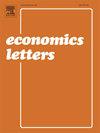Reimbursement in contests with bilateral delegation
IF 2.1
4区 经济学
Q2 ECONOMICS
引用次数: 0
Abstract
We study two-player contests in which each player first hires a delegate to expend effort on her behalf, and then the delegates choose their effort levels simultaneously. The losing player pays the winning player reimbursement for part of the effort (cost) that the winning delegate expended. We find that each player offers her delegate greater compensation (in the case of winning) in the model with reimbursement than in the model without reimbursement. The equilibrium expected payoffs for the delegates [players] are greater [smaller] in the model with reimbursement than in the model without reimbursement. As the reimbursement rate increases, each player offers her delegate greater compensation (in the case of winning), economic rent for each delegate increases, and each player is worse off.
与双边代表团竞赛的报销
我们研究了两个人的竞赛,在这种竞赛中,每个参与者首先雇佣一名代表代表自己付出努力,然后代表们同时选择自己的努力水平。失败的玩家支付给获胜的玩家补偿获胜代表所花费的部分努力(成本)。我们发现,在有补偿的模型中,每个参与者向其代表提供的补偿(在获胜的情况下)比在没有补偿的模型中更高。在有补偿的模型中,代表(参与者)的均衡预期收益大于(小于)无补偿的模型。随着补偿率的增加,每个玩家会给自己的代表提供更多的补偿(在获胜的情况下),每个代表的经济租金也会增加,每个玩家的境况也会变差。
本文章由计算机程序翻译,如有差异,请以英文原文为准。
求助全文
约1分钟内获得全文
求助全文
来源期刊

Economics Letters
ECONOMICS-
CiteScore
3.20
自引率
5.00%
发文量
348
审稿时长
30 days
期刊介绍:
Many economists today are concerned by the proliferation of journals and the concomitant labyrinth of research to be conquered in order to reach the specific information they require. To combat this tendency, Economics Letters has been conceived and designed outside the realm of the traditional economics journal. As a Letters Journal, it consists of concise communications (letters) that provide a means of rapid and efficient dissemination of new results, models and methods in all fields of economic research.
 求助内容:
求助内容: 应助结果提醒方式:
应助结果提醒方式:


